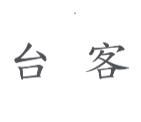 The term taike (táikè, 台客 — with “tai” as in “Taiwan” and “ke” as in “guest”) has historically been used predominantly by mainlanders in Taiwan as a pejorative for ethnic Taiwanese they view as unsophisticated and crude.
The term taike (táikè, 台客 — with “tai” as in “Taiwan” and “ke” as in “guest”) has historically been used predominantly by mainlanders in Taiwan as a pejorative for ethnic Taiwanese they view as unsophisticated and crude.
In recent years some Taiwanese have attempted to reclaim the word for themselves as “an expression of strong national consciousness and Taiwanese cultural elements,” as the Taipei Times puts it. Whether they’ve been particularly successful in this could be debated. For example, more than a few of the giggling, empty-headed entertainment figures on Taiwan television will often jokingly accuse someone on their show of being “hǎo tái,” where tai is a short form for taike and meant as synonymous with dījí (低級, vulgar). It makes me want to slap those media celebrities upside their damn-fool heads. But watching TV here often brings out such feelings in me. Anyway, I digress.
Neuron Innovations (Zhōngzǐ Chuàngxīn / 中子創新), organizers of the TK Rock Concert, has been granted a trademark here in Taiwan for 台客 (taike). It’s a bit as if a company in the States running a gay-rights-themed rock festival named “Fag Fest” had been given the trademark on not just “Fag Fest” but the word “fag” itself.
The illustration in this post is the submitted trademark. As is obvious, there’s nothing whatsoever special about the design; it’s just the plain characters.
Some politicians and academic figures have called for the trademark to be repealed, including Legislator Lin Shu-fen of the ruling Democratic Progressive Party.
Lin said that taike should be regarded as a kind of “public good” or “cultural good” and no one should be allowed to monopolize the usage of the term.
“Making taike a registered trademark is detrimental to popular culture,” Lin said.
She said that members of the public might face an infringement lawsuit if they used the term in symposiums, music competitions, or film festivals or in the names of their published books or magazines, among other things.
Hung Shu-ming (洪淑敏 [Hóng Shūmǐn), the head of the trademark division at the Intellectual Property Office (IPO), did not think it improper that the bureau had granted Neuron Innovations the trademark.
“The application for taike registration was approved because Neuron Innovations has a leading position in hosting taike Rock concerts in recent years,” Hung said.
Lin responded by saying that “first come, first served” was not a good reason for Neuron Innovations to get the trademark, as LTK (濁水溪公社 [Zhuóshuǐ Xī Gōngshè), a local band which released an album titled Revenge of the Taike ten years ago, would have owned the trademark.
Lee Ming-tsung (李明聰 [Lǐ Míngcōng), an associate professor of sociology at National Taiwan University, urged the IPO to repeal the taike trademark as it is integral to the popular culture.
sources and further reading:
- Intellectual property officials asked to keep ‘taike‘ public, Taipei Times, August 8, 2007
- trademark information for taike (in Mandarin). Note: You may need to manually set your browser to Big5 in order to view the characters here correctly. Also, why is a government office using a Hinet site instead of its own?
- taike thread on the Taiwan Intellectual Property Rights Office’s Web forum, accessed August 11, 2007
- Taiwanese have changed ‘Taike‘ for the better: Chen, Taipei Times, September 2, 2005

A daft ruling, of course, and one that should hopefully be reversed. Speaking of things “tái” – as you will know a female who fits the “taike” mold is said to be a “Táimèi”, as immortalised in the downright dirty (and very un-PC) song 我愛台妹 (Wǒ ài Táimèi) from a couple of years ago by the taike rapper MC Hotdog (熱狗), who also found time to have a dig at Taiwanese celebrities Lin Chih-ling and Patty Hou while he was at it:
(Pinyin amended to reproduce the full “Taiwan Goyi” effect)
“Wǒ ài Táimèi, Táimèi ài wǒ;
Duì wǒ lái suō Lín Zìlíng suàn séme?”
我愛台妹,台妹愛我;
對我來說林志玲算什麼?
Roughly:
“I love Tai chicks, Tai chicks love me;
That Lin Chih-ling does nothing for me”
There are also references in the song to many supposed taike trademarks – “One night in Kending” (parodying the famous old tune “One night in Beijing”) and lines about betel nut, “going down to Tainan” (which I think is probably a double-entendre), pole-dancing, and not skimping on child support. Classy.
Pingback: David on Formosa » Links 13 August 2007
Don’t restrain yourself. I’ll be cheering you the whole way.
Amazingly, a number of Taiwanese students are still unfamiliar with this term. When asked what it means by one of my colleagues, some of our students responded with answers like “Taiwanese Tourists” or “Hakka in Taiwan” and other such phrases which could be formed by the Mandarin abbreviation … The only explanation we could come up with is that they don’t read the newspaper.